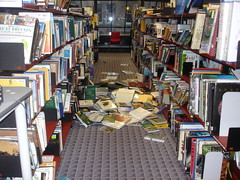 Image by Christchurch City Libraries via Flickr
Christchurch
Image by Christchurch City Libraries via Flickr
Christchurch residents rally over 'third world' conditions - post
earthquake news...
The way it really is, residents claim:
A digger demolishes buildings in Christchurch after the earthquake.Dozens of angry residents have rallied in one of Christchurch's worst earthquake-hit areas to let the world know their situation is not fixed, and they are still living in "third world" conditions.
About 100 people gathered in a badly cracked, silt-covered
cul-de-sac in the suburb of
Avonside today to express their frustration at still being in limbo and without basic services 18 days after the devastating 7.1 magnitude quake.
The residents, many Housing
New Zealand tenants, are living in cracked and sunken homes, still managing without sewerage and drainage, uncertain about using the water, getting sick from contaminated silt that has come from underground, and worried what their futures hold.
They are upset that the message being sent to the rest of the country is that Christchurch is getting back on its feet when they feel far from it.
"You see on TV the devastation of
third world countries or war. And that's what it felt like for the first week," said Angela Wasley, a resident of the cul-de-sac and rally organiser.
"It's absolutely exhausting. It feels like you have gone camping, and the campsite hasn't quite got the right utilities. We've got power.....but nothing else. Water comes and goes. So you can't wash, you can't flush the toilet."
"You don't really want to be in the area, because it feels like it has been demolished, and it feels broken. You don't want to not stay in your house because there's burglaries around."
"We've got this contaminated silt flying around everywhere which we can't wash off, and it's getting into our throats. We've had sore throats for about 10 days now."
Ms Wasley, who lives with her seven-year-old son and father, said she did not know yet whether her home would have to be demolished, and where she would go next.
The
aftershocks after the big quake meant the "cracks keep widening".
Beneficiary Karron Gosney has slept in her damaged rental home in the largely deserted cul-de-sac every night since the earthquake, when most other houses are deserted.
"As much as we want the people of Canterbury to get back to normal, they have got to realise that a lot of us are living worse now than what a lot of people were day one of the quake."
"We are not a rich neighbourhood. A lot of us do not have access to bank loans or overdrafts or
credit cards. So we are trying to do it out of our benefits."
Ms Gosney uses a shower at a local gym and the toilet at a local
shopping centre.
"We don't all have friends and family that can put us up."
Mark Christison, of the Christchurch
City Council's earthquake recovery team, said the team was working long hours and doing its best to get at least "limited services" restored to all homes.
"Typically the city renews about 4km of sewer a year in its network. The sort of damage that we are seeing from this earthquake could be anything from 20-30km to 100km. So that gives you an idea of the magnitude of the job thats in front of the recovery team.
http://www.christchurchquakemap.co.nz/ CHRISTCHURCH QUAKE MAP
http://peter-petterson.blogspot.com DOWN BY THE HUTTRIVER
 Image via Wikipedia
Image via Wikipedia














